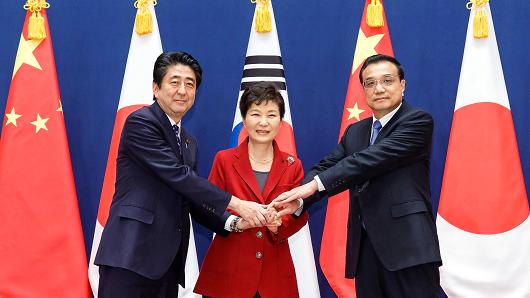Seoul summit: Big breakthrough or just hot air?
Leaders of China, Japan and South Korea held their first joint meeting in over three years on Sunday, and one expert thinks the talks signify a breakthrough that could yield closer relations among the Asian giants.
"All of us in the U.S. have been deeply concerned about the lack of contact between the highest levels in South Korea and Japan, as well as the issues between Japan and China. I can only applaud this meeting and I think it may be more than a good first step," Thomas Hubbard, who was the U.S. Ambassador to South Korea from 2001 to 2004, told CNBC Asia's "Squawk Box" on Monday.
"It may be a significant step toward closer relations in Northeast Asia," he added.
The three-way sit-down in Seoul, which involved Chinese Premier Li Keqiang, Japanese Prime Minister Shinzo Abe and South Korean President Park Geun Hye, comes after a lengthy hiatus as issues dating back to the World War II soured Japan's relations with its two neighbors in recent years. The three Asian countries, which only kickstarted the annual trilateral summits in 2008, held their last meeting in 2012.
The 90-minute summit on Sunday covered a wide range of topics, with the leaders issuing a commitment to greater economic integration and a resumption of the three-way summits on an annual basis. According to Reuters, South Korea's Park agreed with her Northeast Asian counterparts to work towards the conclusion of the Regional Comprehensive Economic Partnership (RCEP) and a separate free trade deal between the three economies.

South Korean Presidential Blue House via Getty Images
South Korean President Park Geun-Hye (C) poses with Japanese Prime Minister Shinzo Abe (L) and Chinese Premier Li Keqiang (R) at the presidential Blue House on November 1, 2015 in Seoul, South Korea.
"This trilateral summit is very important as it indicates the three economies' willingness to push forward economic integration of the Northeast Asia, a process that has been hindered by the political disputes between China and Japan, [as well as] South Korea and Japan. This may mean that China is ready to put aside its rising nationalistic emotions for the exchange of further economic cooperation with Japan in the context of unprecedented economic slowdown in China. The future trilateral free trade area could also make Northeast Asia a formidable economic and trade bloc that can compete with the E.U. and North America," Chen Gang, a research fellow at National University of Singapore's East Asian Institute, told CNBC in an e-mail interview.The leaders also reaffirmed their "firm opposition to the development of nuclear weapons on the Korean peninsula," referring to North Korea's pursuit of atomic weapons despite international sanctions and condemnation.
"The three key countries dealing with North Korea are the U.S., China and South Korea. Cooperation between these countries are important and we can only be pleased when we see our partners trying to bring about change in North Korea by meeting together and renewing their commitment in resolving the nuclear issue," Hubbard said.Some analysts, however, have greater reservations about the talks, noting that there were no "surprises" from Sunday's trilateral summit, which skirted contentious issues that had fueled tensions between the East Asian economic giants.
"The 12-page long declaration did not contain any surprises. It was carefully drafted, politically correct with cautious downplay of contentious issues and diplomatically highlights matters of cooperation," Lim Tai Wei, a senior lecturer at Singapore's SIM University, told CNBC in an e-mail interview.
Instead, the summit signaled Seoul's ascend to "the middle power of the region," according to Lim.
"South Korea deserves credit as the middleman who not only maintains good relations as an important partner of Beijing that joined the China-led Asian Infrastructure Investment Bank (AIIB) and [sent] its head of state as an attendee of the 70th anniversary of WWII in China," Lim said.
"At the same time, President Park's adroit diplomacy also saw South Korea hailed as the close ally of Washington during her recent visit to the U.S. South Korea comes away from the talk with the status as a pivot in Northeast Asian relations," he added.
HEADLINES
- Do shipping markets want Biden or Trump for the win?
- All 18 crew safe after fire on Japanese-owned tanker off Singapore
- Singapore launching $44m co-investment initiative for maritime tech start-ups
- Cosco debuts Global Shipping Industry Chain Cooperation Initiative
- US warns of more shipping sanctions
- China continues seaport consolidation as Dalian offer goes unconditional